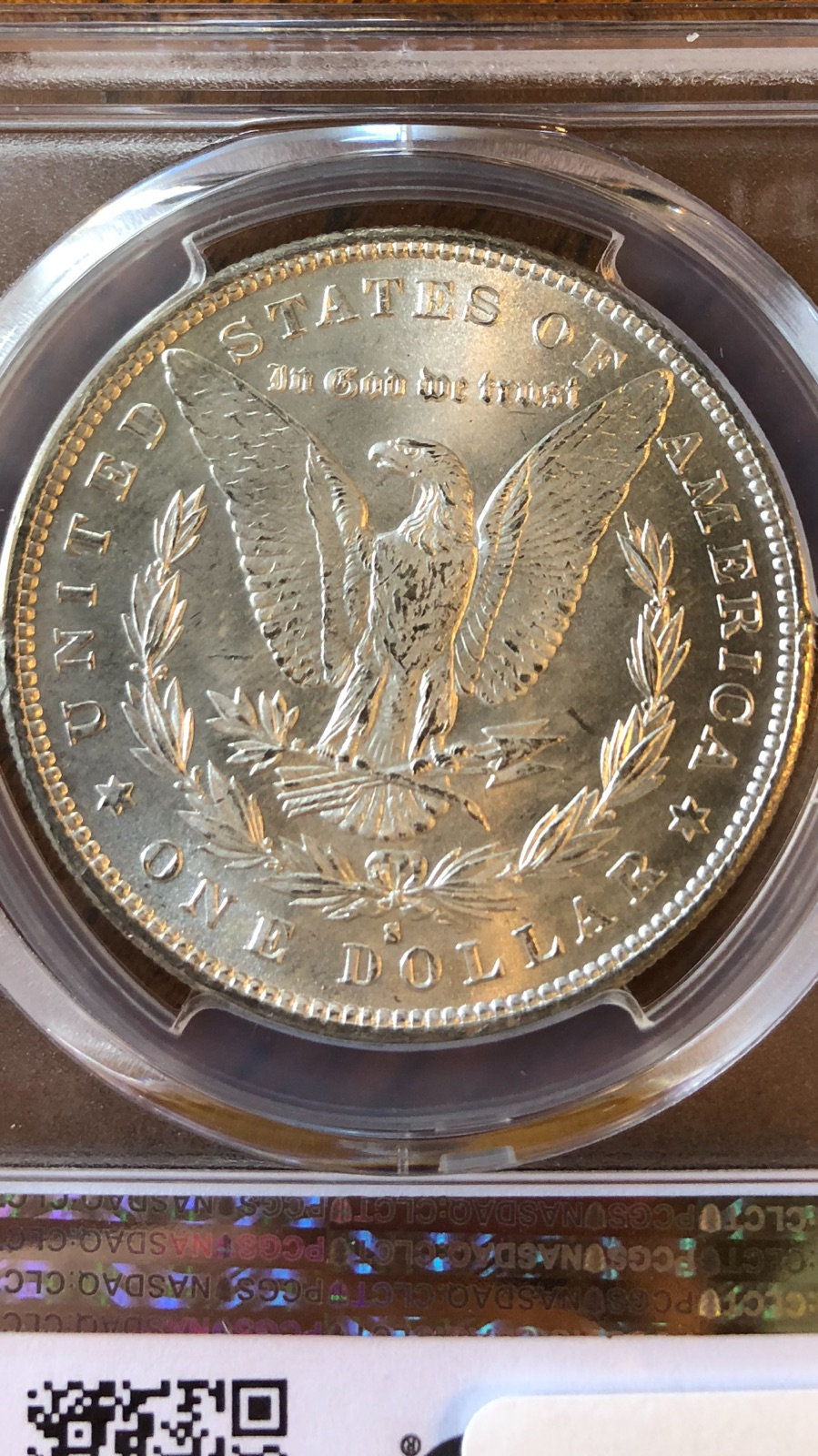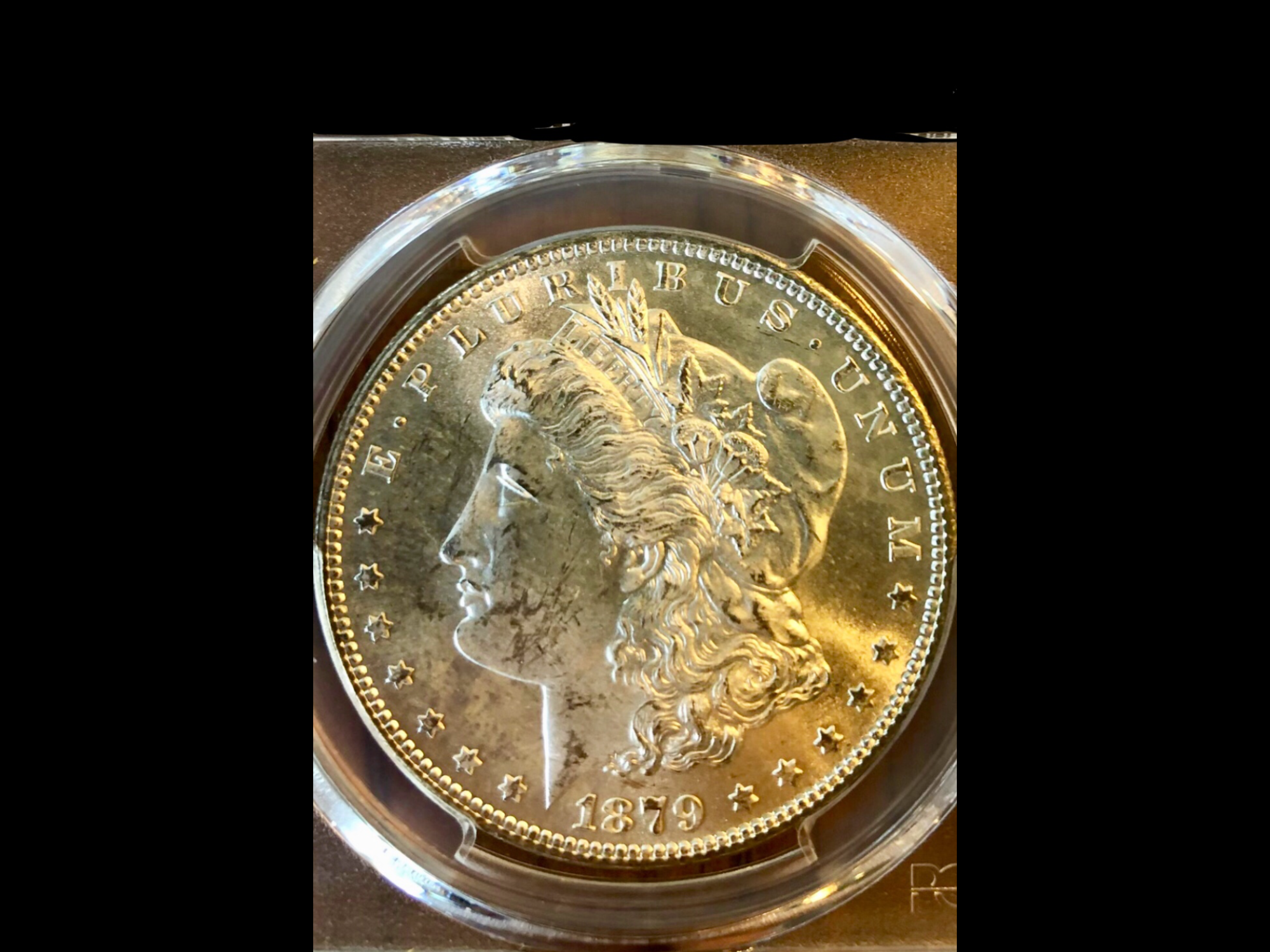Just got this, can you guess the grade.
 Thecoinlector
Posts: 67 ✭
Thecoinlector
Posts: 67 ✭
I will be revealing the grade in a bit. (Grade is 64)

1
 Thecoinlector
Posts: 67 ✭
Thecoinlector
Posts: 67 ✭
I will be revealing the grade in a bit. (Grade is 64)

Comments
63
63
65
62+.
58
The grade is a 64 and I am going to get a nickle graded soon which I am very sure is an ms 66 1972 d nickle with full steps.
MS63
63 CAC green
Could some of you more experienced graders answer a few questions?
1) how would your describe the characteristics of this coin that you use in evaluating it?
2)How would you use the terms "luster" and "skin" in describing this coin?
3) what causes the marks on this coin to be so apparent and in such high contrast to the "untouched" areas of the coin?
4) are marks on the highest relief areas of the coin, (cheek - breast) more likely caused by a scraping or rub type of damage as opposed to a strike or hit from contact with other coins?
Much appreciated. I find the look of this coin to be out of norm of the types of MS Morgans that I feel more comfortable evaluating, so I would like to understand why it looks the way it does.
Thanks,
Paul
The camera that I have been using makes marks on coins look very different from how they look in reality.
I was reminded of this coin that I inherited from my grandfather. I don't know if it is represented in the image (it's my first!), but it has incredible clear, mirrored fields, but damage on the relief areas that I don't understand. Any education would be greatly appreciated.
Paul
Need to look up a few thing on that
Best place to buy !
Bronze Associate member
64
Successful Trades: Swampboy,
For those who would be interested... here's the obverse.
65 darling coin
65 pl for the cc
65 for the s
I think the picture accentuates the minor aberrations on the devices... so 64 is likely a fair grade. Cheers, RickO
63 for the op coin
I was gonna go 63 on the first coin, but 64 is a fair grade, IMHOP.
Pete
64
MS-63 for the OP coin.
Overall you need to remember that we have only two views of this coin. In the live grading process, there are many views at different angles. Therefore what I say here is “one dimensional.”
Paul,
I'll take a shot as you requested. But first, it is not a good idea to put an image of another coin on into a discussion. It confuses things when folks start writing about two different coins. I've noticed this is common around here as members like to stick one of their similar "This one is mine" into a discussion. IMHO, WHO CARES, unless they take the time to write what is relevant on their coin beside "bragging rights."
WHO CARES, unless they take the time to write what is relevant on their coin beside "bragging rights."
Now to the OP's coin. When I finish, why don't you start a NEW DISCUSSION? Post your coin and then try to do what I've done here. We can all comment on your thoughts.
First, look at the entire coin. The obverse is most important so start on that side. Is it Uncirculated? Look for places on the highest parts of the design that become dull and gray (on silver coins). I see none. The only real change of color is from the marks.
So, the coin is Mint State (Uncirculated).
MS coins are judged by their LUSTER, STRIKE (not so much anymore - this is an entirely new discussion), MARKS (number, severity, location), and EYE-APPEAL (combination of everything).
Luster: There are several types of luster. The OP's coin has Full Mint Luster and it is "flashy." According to the ANA's Grading Standards, it's above average or exceptional
Next, Strike: All the details are present on the high points so I'll say normal to strong.
Marks: I teach students to put the number of marks into an adjective such as none, hardly any, few, some, many, very many, etc. The marks show up as breaks in the luster. I'll say the OP's coin has "some" on the reverse (hardly any in the field where they tend to be more detracting as they are not obscured by the design details) and "many" on the obverse - some are bad. The right side of the obverse is "clean." The cheek and right field is not. The ANA guide says an MS-63 may have distracting marks in the Prime Focal Area (cheek and field in front of the face). For an MS-64, the marks should be fewer and less severe. That's why the reverse is a 64+ or 65 as the blazing luster takes your eyes away from counting marks. In the "old days" this may have been graded as a 63/65.
Eye Appeal: This is in the eye of the grader.
64: Pleasing
65: very pleasing
66: Above average
Most folks would be in the MS-65 range (very pleasing). However, high its eye appeal, the marks in the obverse field and cheek limits its grade to a 64 or 63.
I'm a 63. Folks who grade it 62 are bothered by the nasty marks on the face. Over time, I've learned that a 63 can still be beat up if the coin is really fresh and attractive. But there is a problem you cannot teach. On one hand, this date comes nice so that tends to hold down the grade for this coin. On the other hand, it is not a valuable coin so the grading may be loose.
As for luster, that comes to the coin when it was struck. "Skin" is a surface film that occurs later for all types of reasons.
The marks contrast with the coin's luster because both are "fresh." The surface is "frosty white" and becomes "bright silver" when hit. There is no RUB on the coin. All the marks appear to be from contact with coins.
@Insider2 I can't tell you how much I appreciate the information in your response. First, thanks for the guidance on the best way to use coin images on this forum. As this is my first image post, your direction is helpful. Second, the information related to grading is the stuff that I really search for as I read through all of the threads on this forum as there is an incredible amount of knowledge and experience here. I've seen this information before somewhere in books that I've read, but conveyed the way that you just did related to actual questions I have about a specfic coin, it has much more educational impact... Thanks for taking the time to share your experience!
You are not done. Do you have the ANA Grading Guide yet? This is only a "starter" that will get you in the ballpark. Read the introduction. Then turn to the Morgan dollar section where there is a chart about luster, etc. With the chart in hand, take a guess at the grade of your coin. Do this in another NEW discussion using the image of your coin above. Title the discussion: "Help me learn to grade." A coin's strike is not on the chart. but the marks are. Your coin will fall into a range for each category. Say 63/64, 62/63, 66/67, and 65/66. You'll need to combine all those to get a single grade. It's easy...LOL.
My coin is 64 just saying for the people that are still commenting on mine.
Nice 64
rainbowroosie April 1, 2003
63+ on the 1879-S -- those marks on the obverse are too noticeable, and I do not think that the photography makes them look that much worse than in hand. The small spread between 63 and 64 on an 1879-S probably accounts for the 64 grade -- when it doesn't really matter, and the coin has nice eye appeal, why not give it the higher grade?
64+, either PL or DMPL, on the 1884-CC. Great looking GSA hoard coin, a bit too many small hits for 65. The "damage" on the reverse relief areas is not damage -- some Proof-Like 1884-CC dollars have this, most likely due to die preparation. It looks odd until you have seen dozens of them that look exactly the same as this coin.
Nice coin, I like the frost.
My YouTube Channel